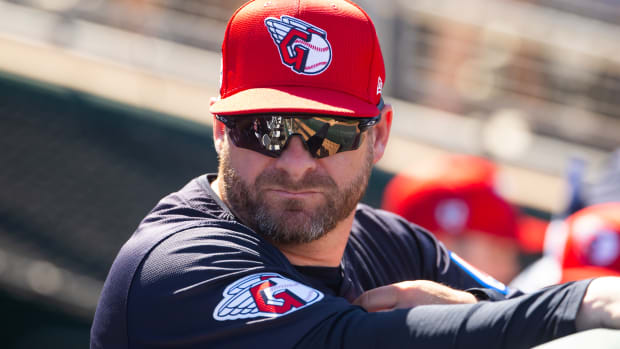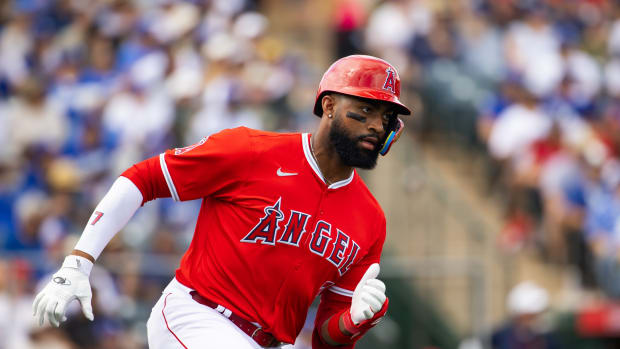The Perilous Life of Rookies in the Big Leagues
NEW YORK — Michael Chavis made his first major league error a week after his debut, rushing a throw that sailed off the Fenway Park home dugout. His second came a few days later when he boarded an elevator at Chicago’s Guaranteed Rate Field. The game had just ended, and he was deep in thought when he looked up and realized he was surrounded by veteran players. He froze before jumping back in the hallway.
“I can’t take the first elevator,” says the Red Sox’ first baseman. “After a game, veterans get on first. … It’s really easy to forget for a moment and then you look up and you’re like, I gotta do something else!”
The challenges of being a rookie—a “nobody,” as Chavis puts it—are not limited to catching up to big league pitching. New call-ups must also navigate a complicated social hierarchy that sometimes catches them by surprise.
The most important statistic in a baseball clubhouse is not batting average or wRC+ or even salary; it’s service time. Every player knows how many years he has in the big leagues. Most know how many their teammates have, too. In April, the Red Sox bought pitchers David Price and Rick Porcello a pair of sheet cakes to commemorate their reaching 10 years of service time. The Rays’ player parking spaces are allotted based on seniority. (When they traded away seemingly half the team at the deadline last year, those left behind showed up the next day unsure of where to put their cars.)
Making the majors is the realization of a dream. So you can understand why many a new big leaguer admires his new locker, gently touches his new jersey and collapses delightedly onto the plush leather couch in the center of his new clubhouse. Big mistake.
“I sat down and found out the hard way,” says Mets first baseman Dominic Smith, who made his debut in 2017. “They told me to go sit at my locker. Not gently at all.”
Giants catcher Stephen Vogt, who came up with the Rays in 2012, laughs. “I still haven’t sat on a couch, and I have five and a half years in the big leagues!” he says. “I said, ‘When do you know?’ And they said, ‘You’ll know.’ It’s kind of like a metaphor. Don’t get too comfy.”
Almost all seating is fraught. Teams typically dispatch two buses to ballparks on the road, one at a reasonable hour and one just a little too early. Rookies are universally required to be on the first bus … when they are allowed to be on any bus at all. During Vogt’s Tampa tenure, freshmen had to be at the ballpark by the time the first bus left the hotel. That meant a lot of cab rides.
In general, rookies should be last on the bus, last off the bus, last on the plane, last off the plane. The kids also sit together, although where depends on the team. Some clubs reserve the front seats for grownups, some the back. Heaven help a rookie who gets traded midseason.
And of course, the newbies are responsible for the beverage service, heaving cases of beer and water on board. Relatively speaking, they have it good. Veterans used to toss their bags at the kids, leaving them to haul the luggage onto the bus—and also figure out where each player planned to sit.
Once they arrive at the park, rookies are expected to learn both their own routine and everyone else’s—then make themselves scarce. The visitors’ clubhouse at Yankee Stadium has room for three scouting laptops in a hallway; when Chavis sat at one before a recent game and the other two filled up, he kept his head on a swivel in case someone else wanted his. Rookies should use the batting cage and the training room before the veterans want to, and leave when anyone else shows up.
When Kevin Pillar, now with the Giants, debuted in 2013 with the Blue Jays, veterans made clear rookies were not welcome in the training room. You’re 24. How much pain can you be in? But Pillar came up in mid-August, after playing nearly a full season between Double and Triple A. He was in pain. So he engaged in what he calls “self-medicating,” taping his own hamstrings and using a hotel room key—rather than the official device the training staff employs—to break down scar tissue in his arms.
The point of all this, according to players, is to teach an important lesson: Respect the game. Don’t get caught doing nothing, veterans warn rookies. Are you really as prepared as you can possibly be? There’s nothing else you could be doing?
“Our job as veterans is to kind of get on the rookies a little bit,” says the Giants’ Evan Longoria, who came up with the Rays in 2008. “Not to be an a-hole, but to really help them understand.”
Sometimes, though, their goal is just to amuse themselves. Veterans used to force rookies to dress in embarrassing costumes, usually as women, but the newest CBA banned the practice. One favorite tradition still lives on: The Cardinals and Dodgers, among others, have sent freshmen to get coffee—in full uniform. The Angels require rookies to research topics and then do presentations on them during spring training. And almost every team occasionally gets bored on a long bus ride and directs the rookies to sing or answer inappropriate personal questions.
“If you don’t sing it well, you get sent to the bathroom,” Pillar says, then clarifies, “I sang well.”
Anyway, Pillar says, he had it easy. He has heard tales from older teammates who suffered worse indignities. “There was no rules back then,” he says. “There was no camera phones. There was no social media.”
Pressed for an example, he settles on that of R.A. Dickey, who came up in 2001 with the Rangers. “Guys would try to light him on fire!” he claims.
Dickey, now retired, is nonchalant. “We had a pyromaniac in the bullpen,” he says. “[My fleece] went up like a Roman candle.”
In another workplace, these are—if you will—fireable offenses. In baseball, they are just a reminder that you’ve made it. Being a serf in the majors beats being a king in the minors. It’s like that old joke: What do you call the person who graduates last in his class in medical school? Doctor.



































